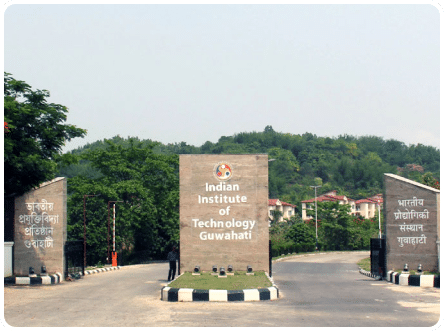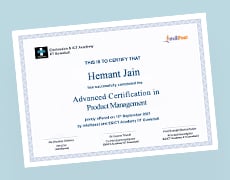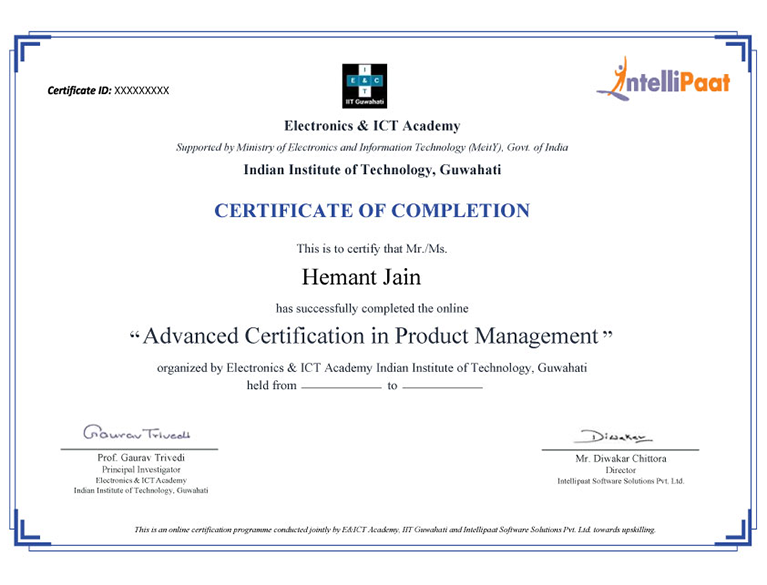Your cart is currently empty.


6 Months Program
Learning Format
Online Live Classes
Certification
E&ICT IIT Guwahati
Career Boost
Resume & Interview Prep
With Job Assistance
Best For
College Students, Graduates and Working Professionals
Looking to Switch to Product



Our learners have successfully transitioned into high-growth product roles, securing up to ₹45 LPA, regardless of their previous background.
Over half of our learners reported a significant salary boost post-program, accelerating their transition into core product management roles.
From IIT-certified curriculum to dedicated career support, 95% of learners expressed high satisfaction with the program.
Managing Product Development Methodology
Microsoft Excel
Project Management Tools – JIRA Software for Beginners
Dashboards
UML 2.0
Dashboards
Product Launch Strategies
Sustaining and Managing Product Lifecycle
Post-Launch Review and Continuous Improvement


This advanced certification program is in partnership with E&ICT Academy, IIT Guwahati. E&ICT, IIT Guwahati is an initiative of the Ministry of Electronics and Information Technology (MeitY), Govt. of India, and formed with the team of E&ICT IIT Guwahati professors to provide high-quality education programs.
Achievements of IIT Guwahati
Upon the completion of this program, you will receive:



This Advanced Certification in Product Management course has been designed by top experts in the field with a deep understanding of industry requirements. The course covers various projects and assignments that will assist you in becoming job-ready and taking on challenging roles within the product management industry.
This Advanced Certification in Product Management course offers numerous benefits. It provides in-depth knowledge of product management principles, strategies, and best practices through a comprehensive curriculum. Additionally, the course offers practical hands-on experience through real-world projects, industry insights from expert instructors, and valuable networking opportunities with fellow learners. By enrolling in this course, you can gain the skills and confidence needed to excel in the dynamic field of product management.
Advanced Certification in Product Management offers a wide range of job opportunities, including product manager, product owner, product marketing manager, and strategic product planner. These roles exist in various industries and companies of all sizes. With the increasing demand for skilled product managers, the field provides promising career prospects and growth potential. There are 25,000+ job opportunities for professionals in India alone and over 260,000 job opportunities in the USA.
Upon completing this Advanced Certification in Product Management, you unlock a wide range of career opportunities. As a certified product manager, you can pursue roles such as product manager, product strategist, product marketing manager, or even start your own product-oriented ventures. The scope extends across various industries, including technology, e-commerce, healthcare, finance, and more. You will be equipped to lead product development, drive innovation, and contribute to the success and growth of organizations.
The average salary for professionals in product management roles varies based on experience and industry. Generally, entry-level positions start from ₹6,00,000 per annum, while mid-level positions can range from ₹10,00,000 to ₹18,00,000 per annum. Senior roles, such as Senior Product Manager or Head of Product, can command salaries upwards of ₹25,00,000 per annum.
The course covers a wide range of topics, including the product life cycle, growth product management, product vision, strategy, and research, market research, pricing strategies, agile methodologies, user experience design, data analytics, and more. It also includes hands-on projects and case studies to provide practical experience.
The course is taught by experienced IIT faculty and industry experts with extensive experience in product management. Practitioners from leading companies also provide insights into real-world challenges and best practices.
Intellipaat is renowned for its high-quality product management training courses and industry mentorship. Our alumni have successfully secured positions in esteemed global organizations such as Amazon, Microsoft, Genpact, Sony, Gartner, and more. Additionally, learners gain lifetime access to free upgrades and course materials, providing ongoing support throughout their careers. By enrolling in Advanced Certification in Product Management course, you can take advantage of exclusive career guidance, interview preparation, and other valuable benefits.
Upon successful completion, you will receive an Advanced Certification in Product Management from EICT IIT Guwahati, which is recognized and valued in the industry.
The course is structured into various modules, each focusing on different aspects of product management. It is designed to be completed in 6 months, with a mix of online lectures, interactive workshops, and practical projects.
Intellipaat is offering 24/7 query resolution, and you can raise a ticket with the dedicated support team at any time. You can avail of email support for all your queries. If your query does not get resolved through email, we can also arrange one-on-one sessions with our support team. However, 1:1 session support is provided for a period of 6 months from the start date of your course.
Intellipaat is offering you the most updated, relevant, and high-value real-world projects as part of the training program. This way, you can implement the learning that you have acquired in a real-world industry setup. All training comes with multiple projects that thoroughly test your skills, learning, and practical knowledge, making you completely industry-ready.
Intellipaat actively provides placement assistance to all learners who have successfully completed the training. Intellipaat certification is recognized by over 3100 hiring companies around the world. This way, you can be placed in outstanding organizations such as Sony, Ericsson, TCS, Mu Sigma, Standard Chartered, Cognizant, and Cisco, among other equally great enterprises. We also help you with the job interview and résumé preparation as well.
Yes, Advanced Certification in Product Management is highly valuable. It not only validates your expertise and knowledge in product management but also enhances your credibility in the job market. It demonstrates your commitment to professional growth and can significantly increase your chances of securing rewarding career opportunities in the field.
This Advanced Certification in Product Management course introduces a range of industry-standard tools and platforms used in product management. These may include market research tools like surveys and customer feedback platforms, as well as data analytics software for analyzing product performance and user behavior, project management tools for organizing and tracking tasks, and collaboration platforms for seamless team communication and coordination.








 Click to Zoom
Click to Zoom